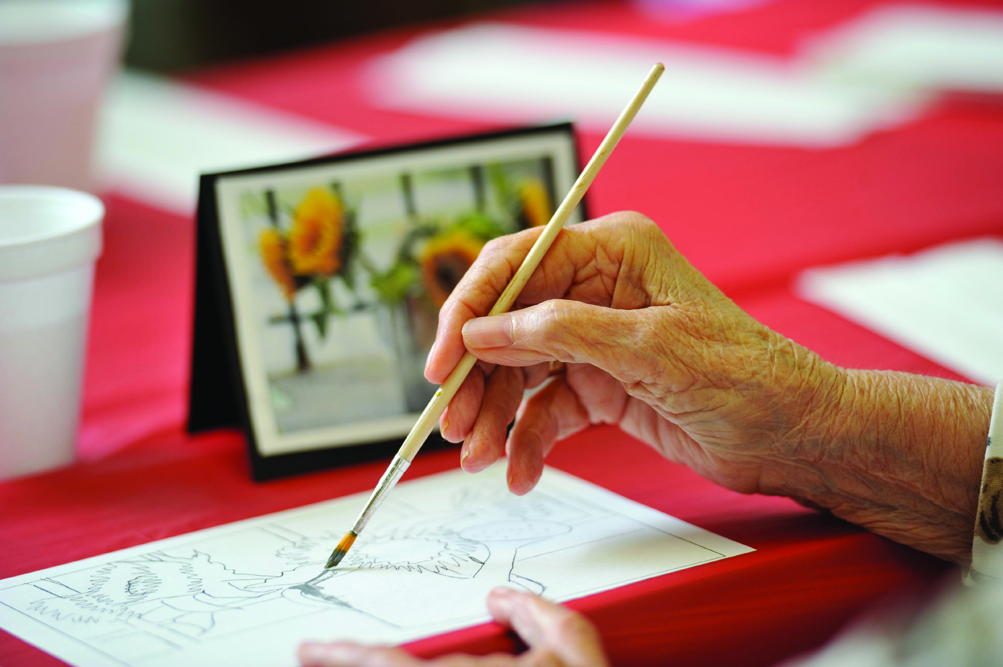3 Tips for Cultivating Happiness in Old Age

Not only is happiness in old age possible, it’s actually to be expected. With advances in modern medicine, aging adults are living healthy lives well into old age, and they seem to be enjoying it!
Of course, by their 70s, most people have experienced at least some amount of hardship. But seniors also tend to have a healthy sense of self-esteem, less stress and worry, and are quicker to get over minor problems. We’ve noticed that the happiest elderly adults all seem to have a few things in common. We’ve compiled them into three main tips for how to be happy in old age.
A Healthy Social Life Promotes a Happiness in Seniors
Social activity is key to happiness at any age. We are social creatures who thrive on connection. In fact, the psychologist Abraham Maslow created a hierarchy of needs in 1943 suggesting that social acceptance is a basic need. Maslow believed that all people need to feel like they belong to a social group before they can move on to self-acceptance and self-actualization.
Just think about what happens during social time. We laugh, think, talk, learn, and play. Being around other people is good for your health and wellness. As it turns out, we don’t even need an abundance of social time as we age to feel happy. A Gallup poll conducted in 2011 found that seniors over age 65 report happiness even with just a few hours of social time per day.
Diet and Exercise Improve Enjoyment in Old Age
Everyone knows by now that diet and exercise are important to a happy outlook at any age. Healthy foods give us the energy we need to engage in physical activity. Exercise sends endorphins, the feel-good hormones, throughout the body. Of course, the social aspects of sharing a meal and getting exercise tie it all together for optimal happiness building.
To be happy in old age, it’s important not to overdo it with exercise, and not to be too strict or too indulgent in your diet. Speak with your doctor if you’re concerned about any physical limitations before exercising, and discuss any food restrictions you should be observing.
Exercise doesn’t have to be rigorous for healthy effects. Just going for a nice walk every day is enough for many people, but others enjoy water sports and stationary bike exercises that minimize impact on joints. For a healthy diet that helps you stay happy in old age, choose fresh or frozen vegetables whenever possible, eat a variety of protein and healthy carbohydrates, stay hydrated, and enjoy a moderate portion of dessert. Foods that are overly processed and high in oil will often make people feel lethargic, so keep fried or packaged snack foods within moderation.
Finding Meaning and Purpose as You Age
People who feel like they have a sense of purpose, or who pursue meaning in life, are generally happy. It’s the idea of knowing that life is bigger than just ourselves, which is a concept that most people understand better in advanced age. Getting older does not mean that you must stop contributing to society or looking for new things to learn. Happy elderly people read books, teach classes, learn new skills, join clubs, go on vacation, visit museums, and participate in the arts. They also tend to live generously, sharing resources or knowledge with others.
With advances in technology, even people who are physically limited can participate in many activities. People who enjoy life well into old age are usually busy pursuing experiences and trying new things. If you’re struggling for ideas, start with your local library, community center, or senior center to find out what programs they offer. These are great resources to learn about bus trips, classes, discussion groups, and service opportunities.
Find Happiness in Gratitude
Finding happiness in old age is all about your mindset. If you are thankful for the life you’ve lived, with all its ups and downs, and you appreciate the people and things around you, you’re likely to be a happy person at any age.
Happiness is especially something that the elderly can expertly pass on to the next generations. By enjoying time with your caregivers, visitors, family, and younger friends, you’ll show them what it means to be happy, and you’ll set a great example. We hope you’ll take time to cultivate happiness in your life!
Back to Education Center
